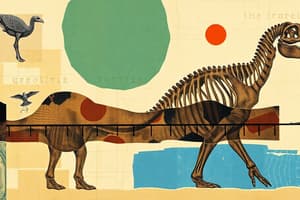Podcast
Questions and Answers
What is the purpose of the Geologic Time Scale?
What is the purpose of the Geologic Time Scale?
It provides a chronological framework for events and helps scientists study the timing and relationships of geological events.
What determines the divisions of Eons in the Geologic Time Scale?
What determines the divisions of Eons in the Geologic Time Scale?
The abundance of certain fossils determines the divisions of Eons.
How are Epochs different from Periods in the Geologic Time Scale?
How are Epochs different from Periods in the Geologic Time Scale?
Epochs are subdivisions within a period, marked by significant changes in the fossil record or geological events.
What is the basis for dividing Eras in the Geologic Time Scale?
What is the basis for dividing Eras in the Geologic Time Scale?
How are the divisions in the Geologic Time Scale organized?
How are the divisions in the Geologic Time Scale organized?
What is the significance of fossils in understanding Earth's history?
What is the significance of fossils in understanding Earth's history?
What major events are marked in the Geologic Time Scale?
What major events are marked in the Geologic Time Scale?
How did the Geologic Time Scale develop?
How did the Geologic Time Scale develop?
What characterized the Mesozoic Era?
What characterized the Mesozoic Era?
Why is the Geologic Time Scale considered a crucial tool for understanding Earth's history?
Why is the Geologic Time Scale considered a crucial tool for understanding Earth's history?
Flashcards are hidden until you start studying
Study Notes
Earth's History through Geologic Time
The Geologic Time Scale is a representation of time based on the rock record of Earth, which divides the history of our planet into specific time periods and units based on the life forms that have existed during these periods. The geologic time scale is essential for understanding Earth's history, as it provides a chronological framework for events and helps scientists study the timing and relationships of geological events. In this article, we will explore the main divisions of the Geologic Time Scale and some key events that occurred during these periods.
Eons, Eras, Periods, Epochs, and Ages
The Geologic Time Scale is divided into several units, in descending order of duration, as follows:
- Eons: The longest subdivision, based on the abundance of certain fossils.
- Eras: The next longest subdivision, marked by major changes in the fossil record.
- Periods: Based on types of life existing at specific times.
- Epochs: Subdivisions within a period, marked by significant changes in the fossil record or geological events.
- Ages: The shortest subdivision, representing a specific time span within an epoch or period.
These divisions are organized stratigraphically, with the oldest at the bottom and the youngest at the top.
Key Events in Earth's History
Throughout Earth's history, several significant events have occurred, as recorded in the Geologic Time Scale:
- Formation of Earth's crust: The beginning of Earth's history, around 4.54 billion years ago.
- Archean Eon: The first 4.0 billion years of Earth's history, marked by the formation of the Earth's crust and the emergence of the first life forms.
- Paleozoic Era: The first 300 million years of Earth's history, characterized by the development of complex life forms and the rise of the first land plants.
- Mesozoic Era: The next 300 million years, during which dinosaurs ruled Earth and the first mammals appeared.
- Cenozoic Era: The last 60 million years, marked by the extinction of dinosaurs and the rise of human ancestors.
These events are marked by major changes in the fossil record, climate shifts, and other geological processes.
The Importance of Fossils
Fossils play a crucial role in understanding Earth's history, as they provide direct evidence of the life forms that existed at specific times. By studying the fossil record, scientists can determine the timing and relationships of geological events and better understand Earth's history. Some key events in Earth's history, such as the Cretaceous-Paleogene extinction event, have been identified through the study of fossils.
The Development of the Geologic Time Scale
The Geologic Time Scale evolved through the efforts of numerous geologists working independently, using the fossil record and stratigraphy to correlate rock strata and establish a chronological framework for Earth's history. As technology and dating methods improve, the Geologic Time Scale will continue to be refined and updated to provide a more accurate representation of Earth's history.
In conclusion, the Geologic Time Scale is a crucial tool for understanding Earth's history, as it provides a chronological framework for events and helps scientists study the timing and relationships of geological events. By studying the fossil record and the geologic time scale, we can gain a deeper understanding of Earth's history and the evolution of life on our planet.
Studying That Suits You
Use AI to generate personalized quizzes and flashcards to suit your learning preferences.




